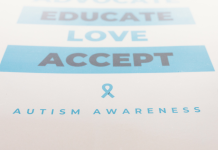 Last fall, our oldest child started kindergarten. This is a huge, exciting, and scary new chapter for many families, but for our family, it was particularly overwhelming. Our son was starting elementary school with food allergies. Most specifically an anaphylactic allergy to dairy and eggs. He had previously attended a small preschool and the teachers had been phenomenal at making sure he was safe with his food allergies. Picturing him eating lunch day in and day out surrounded by little cartons of milk perilously held on to by slippery kid hands in a big cafeteria felt like a big jump. But, by doing some work with our son before the school year began and communicating with our school community, he had a safe and successful year.
Last fall, our oldest child started kindergarten. This is a huge, exciting, and scary new chapter for many families, but for our family, it was particularly overwhelming. Our son was starting elementary school with food allergies. Most specifically an anaphylactic allergy to dairy and eggs. He had previously attended a small preschool and the teachers had been phenomenal at making sure he was safe with his food allergies. Picturing him eating lunch day in and day out surrounded by little cartons of milk perilously held on to by slippery kid hands in a big cafeteria felt like a big jump. But, by doing some work with our son before the school year began and communicating with our school community, he had a safe and successful year.
Prep Work
First, I print out pictures of common snacks that kids tend to eat at school that contain his allergens. Some examples of these snacks are Goldfish, Pirate’s Booty, cheese sticks, and yogurt tubes. I want him to see what the packages and the foods actually look like. How can you know what to avoid if you have never seen it before? I also printed out pictures of safe options that he would likely see at school and that I would be packing for him. Together, we sorted the pictures into piles of safe snacks and not safe snacks.
We role-played with our son so he could have the words to advocate for himself. My husband or I would present him with a new snack he hadn’t seen before and coach him by asking, “Can you check the ingredients for me? I am allergic to dairy and egg.” We also have really tried to instill a rule of “no wrapper, no eating.” If there is no way to actually check the ingredients of a new food, then it has to be a no thank you.
At School
The nurse’s office at school is in charge of our son’s EpiPens. They also have the most up-to-date copy of his allergy action plan. Before dropping the EpiPens off at school, I note the expiration dates on my phone calendar. Next, I set a reminder one month ahead of the expiration dates to give me enough time to refill them when needed. Note – I’m also sure to detail which set of EpiPens are expiring – the set at school, at home, in my purse, etc.
We make sure our son’s teacher and classroom paraprofessional know about his allergy. I let his teacher know that I can provide safe snacks for holiday celebrations or birthdays. I am also happy to provide safe options when it comes to craft supplies (think used egg cartons versus new craft cartons).
In the lunchroom, our son’s lunchbox has a bright red tag that indicates his severe allergies and that his EpiPen is at the nurse’s office. This is helpful as the lunchroom staff fluctuates week to week, and we couldn’t expect them to memorize his allergy while managing an entire room of kiddos! Also, if he mistakenly ate his allergen and was having a reaction that caused him to struggle to speak or breathe, he could simply alert a grown-up by pointing to this tag on his lunch box.
With some preparation and communication, we felt comfortable sending our kiddo with food allergies off on his big kindergarten adventure. Even more importantly, our son felt ready to start school without fear of his allergies clouding the experience.











Maggie’s articles are so helpful!